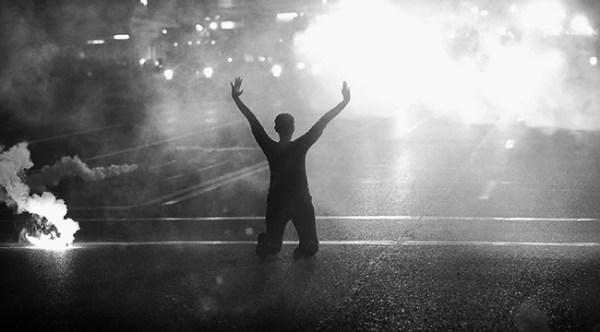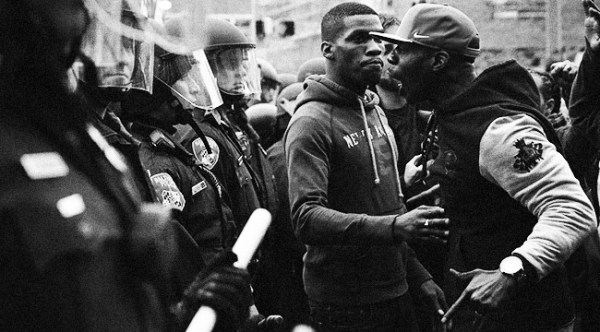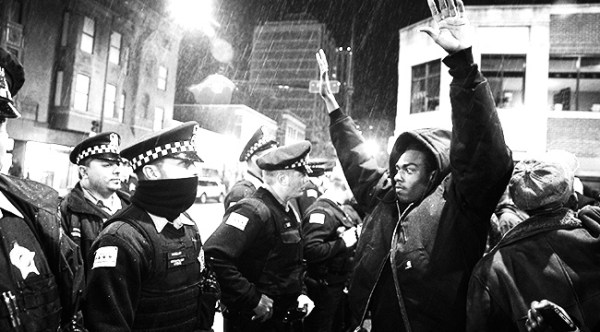
Positions are hardening, to use President Obama’s term. Lines are being drawn in the sands of social media. Either you’re pro Black Lives Matter or pro police — we see it every day on our feeds. It’s tough to find the nuance, especially with our favored sources feeding us more and more of the stuff we want to hear and like-minded friends bolstering our biases. All sides are deeply entrenched, heels dug in the soil.
Black Lives Matter vs. the cops. It’s rarely written that way, but it’s implied when officers abandon their posts at a basketball game because the players choose to wear Black Lives Matter t-shirts, when a conservative commentator calls BLM “the new KKK”, or when media narratives tie the actions of a lone extremist to the entire organization. Over and over we see the two positions treated like trains headed straight at each other. You can only be on one train and you’d better hold on because they’re going to crash. It’s indicative of our time in history, in which the side you’re on seems to be a bigger and bigger part of everyone’s personal identity.
But it’s all wrong. There are no trains. The paths being trod are interwoven, but not oppositional. They form a Venn diagram, not a pie chart. The very notion that Black Lives Matter and the police are diametrically opposed is a false dichotomy, it suggests an “either/or” dilemma that just isn’t real. Look at the Wall Street Journal’s Red Feed/Blue Feed entries connected to these recent shootings — the warring narratives are unrecognizable, though the core information is identical, setting us up for a whole bunch of failed logic. Blue lives and black lives are being pitted against one another.

In the calm cool light of day, these false dichotomies are easy to recognize. Of course you can be supportive of the police and the vital role they play in our society, while still wanting justice for Alton Sterling, Philando Castile, and the millions of black men who live in fear of unwarranted police violence. As Trevor Noah put it, “In reality, you can be pro cop and pro black.”
You can march and protest and be peacefully arrested without ever vilifying all police, just as so many marchers have done in cities across the country. You can also believe in systemic racism in the justice system without thinking that all people working in the justice system are implicitly racist. You can battle for equality without wishing for or promoting violence against law enforcement. You can be a police officer who hugs protesters without betraying your fellow officers. You can honor hardworking, honest cops as heroes, while still demanding that on an individual, departmental, and overarching level, they strive to eliminate racial bias.
None of these ideas are mutually exclusive. There is no duality. It’s not binary.
Rallying against police violence in a protest setting doesn’t imply disrespect or make you anti-cop. To suggest that it does pushes the idea that respect and being questioned are opposite sides of a coin, when they clearly aren’t. We often question the people we respect most (our parents, our teachers, our friends), we push and pull ideas and grow respect through the freedom of discourse.
As pastor Mark Davis told the OC Register this week, “In fact, I would say that one way we show respect for the persons we arm in our society is by maintaining a higher standard for them. Frankly, most of the police officers I know, they expect that for themselves.”

Who doesn’t want a better, more honest, more transparent police force? What police officer doesn’t want that for their own ranks? If being a good citizen somehow requires blanket support of the police, then it’s literally the only job on the face of the planet that enjoys such a privilege.
To have either blanket trust for the police or blanket hatred against them requires a lack of critical thinking and thoughtful engagement. The Black Lives Matter movement has stated and restated the fact that they’re not anti-cop. This is from their FAQ page:
Police officers are people. Their lives have inherent value. This movement is not an anti-people movement; therefore it is not an anti-police-officer movement. Most police officers are just everyday people who want to do their jobs, make a living for their families, and come home safely at the end of their shift. This does not mean, however, that police are not implicated in a system that criminalizes black people, that demands that they view black people as unsafe and dangerous, that trains them to be more aggressive and less accommodating with black citizens, and that does not stress that we are taxpayers who deserve to be protected and served just like everyone else.
The Black Lives Matter vs. Pro Police false dichotomy isn’t the only logical fallacy scarring our current discourse. Hell, it’s not even the only misstated binary connected to this specific issue. Every time someone answers posts about Black Lives Matter with “All Lives Matter!” it’s also creating a false dichotomy. Yes, all lives matter — that’s implied and obvious — it doesn’t preclude the ideas of black lives being given specific attention at this current time in history because those lives are continually treated recklessly by the justice system and have been oppressed on a systemic level for hundreds of years. This has been well explained and thoroughly illustrated since the whole “all lives matter” thing first started.
In order to evolve as a society, we have to know what we are and aren’t actually disagreeing about. Holes in our logic don’t serve anyone. Instead, what if we admitted that certain polarizations in our society aren’t real? That you can be pro Black Lives Matter and pro police? Could we then, perhaps, make progress more quickly? If we broke down the false dichotomies and stopped bickering over them, would we find ourselves marching together more often?
